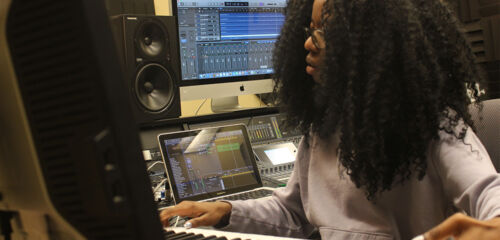
The concentration in Composition and Music Technology cultivates music writing skills for various settings, including traditional concert music, electroacoustic and computer music, film and game music, and songwriting. Students learn to write for traditional acoustic instruments, as well as gaining composition, performance, and production proficiency through technology. Creativity and the development of personal expression are the primary focal points for students following this concentration. Coursework centers on student-driven creative projects for various media, performance with technology, audio engineering, live sound reinforcement, and computer programming. Students are also highly encouraged to enter the certificate program in Digital Studies.
Music technology infiltrates virtually every aspect of music and its related fields. Possible career paths include music production, performance, composition, recording and editing, software and hardware development, systems design, equipment installation, music editing and publishing, as well as numerous audio fields such as the recording and editing of concerts, events, films and television, games, among others.
As scholarship and performance are not mutually exclusive, all music majors are required to declare and study a major instrument, and perform two jury reviews every year. Students are encouraged to take part in the diverse performance opportunities available to enrich their understanding of the music they are studying and composing.
For information about the Composition and Music Technology concentration, contact Prof. Mark Zaki.
B.A. Degree requirements
Music Major Requirements (minimum 48 credits)
Upon admittance to the school, incoming freshman and transfer student music majors should contact the music program coordinator for information on placement exam and audition dates: Prof. Mark Zaki or call (856) 225-6539.
Students majoring in music must earn a grade of C or better in the following courses:
MUSIC CORE REQUIREMENTS (23 CREDITS)
- 50:700:161-162 Musicianship I, II (2, 2)
- 50:700:205-206 Musicianship III, IV (2, 2)
- 50:700:225-226 Music Theory I, II (3, 3)
- 50:700:301 Sound Thinking (3)
- 50:700:291,292 History of Music I, II (3, 3)
All students in the Theories and Histories and Music and Technology pathways will complete and publicly present a capstone project in their final year. This project will be under the supervision of a full-time faculty member with expertise in the student’s area of interest. Performance (10 credits) A minimum of four semesters of applied music on primary instrument or voice (1,1,1,1)
Students must pass keyboard competency examination, normally by the end of junior year. If students do not possess required keyboard skills, they must take applied piano until the proficiency requirement is satisfied.
Music majors enrolled in any applied music instruction (including remedial piano) are required to meet and demonstrate clearly regulated student outcomes through juried examination each semester. Should a student not meet the standards set by the department, the level must be repeated.
One of the following:
- 50:701:140 Rutgers Choir (1) or
- 50:701:347 Madrigal Ensemble (1) or
- 50:701:348 Performance Ensemble (1) or
- 50:701:321 Jazz Ensemble I (1)
Documented attendance at 10 college recitals or concerts each academic year.
Composition and Music Technology (15 CREDITS)
Required (6 credits)
- 50:700:486 Composition and Technology Seminar (3)**
- 50:700:494 Capstone project (3)
Suggested Electives (min. 9 credits)
- 50:700: 302 Sound and Image (3)
- 50:700:373 Introduction to Composition (3)
- 50:700:385 Composition I (3)
- 50:700:391 Music and Computers (3)
- 50:700:392 Topics in Electroacoustic Music (3)
- 50:700:449 Audio Post-Production (3)***
- 50:700:490 Music Internship (BA)
- 50:700:495-496 Honors in Music I,II (3,3)
- 50:700:499 Individual Study (3)
Music majors following the Music and Technology concentration are required to present a comprehensive portfolio of creative/production work during their senior year.
Music majors in the Music and Technology concentration are strongly encouraged to enroll in the Digital Studies Program.
